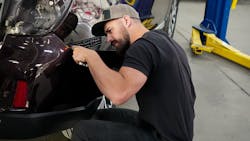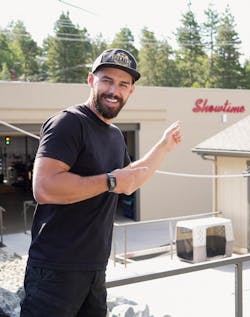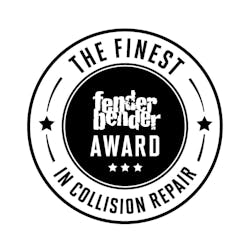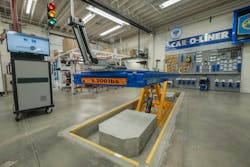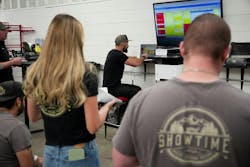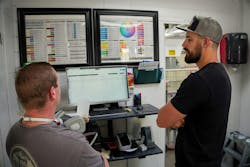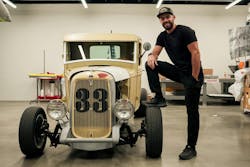Third-Generation Shop Owner Takes Family Business to New Heights
Tyler Makeig grew up with collision repair in his blood, but being a third-generation shop owner of Showtime Collision and this year’s FenderBender runner-up wasn’t what he envisioned as his career trajectory early on.
The family shop, Showtime Custom Coach, Inc., opened in October 1986. Originally, it specialized in limousine manufacturing, specialty vehicle construction, automotive furnishings, and vehicle armoring, but transitioned to collision repair. Growing up around the shop, Makeig swept the floor, picked up dust, and hid in the trunk while the technicians welded and popped it open for them.
His passion at the time was sports, especially basketball. When it came time to decide on what career to pursue, he weighed the value of college versus the “gold mine” of industry information his father had from years as a shop owner. With his eyes set on becoming a future business owner, he chose to pursue the latter.
“I decided to get my degree here in a blue-collar environment,” Makeig said. “I really think in hindsight my dad did it the right way. He had me sweeping floors [and] cleaning toilets. I did car washing, painting, and hired and trained my own employees within those roles.”
Tyler and his wife, Erica, joined the operation in 2010. Tyler made sweeping operational changes while seeking to live up to the high standard of high-quality repairs that his predecessors had built over the years to propel the shop forward.
“I had a chip on my shoulder, being the man taking over the business, that I don’t want it to go backwards,” he said. “I only want it to get better. Every day I focus on improving an aspect of the business.”
The biggest change was moving from a one-tech to team concept. Instead of having one technician start a car and perform all the work on it, Makeig has specialists perform specific duties for each repair, improving the consistency of quality and production numbers.
“That was a really big change that the old heads didn’t agree with,” he said. “My old man thought we wouldn’t be able to produce the same quality that we built our reputation on with one tech.”
He also put a personal focus on learning financials. He dove into labor margins, profits, and incentive programs to maximize profit margins and employee performance. His efforts paid dividends as the shop more than doubled its annual sales under his stewardship.
Six years ago, he started acquiring OEM certifications. Currently, the shop has 15 to its name, including Ford, Honda, Subaru, and Nissan.
“It just goes well with our business model and reputation. The main thing is continuing to be better every day,” he said. “[We want to] give the customer as much as we possibly can.”
Makeig also took a different approach to building his team. He didn’t look for professionals with established skills because they were hard to find, might have bad habits, or might be unwilling to learn new tricks of the trade. He developed a team of people who didn’t have a background in collision repair but could be taught to disassemble and reassemble the car the way he wanted.
“Everybody who works for me now, over 20 people, had no experience in the industry. There's only one remaining member from back when my old man ran it,” Makeig said. “Establishing the crew and culture I have is a big accomplishment for me. In my opinion, that comes first, and then the money will flow later. If you have that, you will provide a quality product for your customers.”
Makeig’s culture starts with his belief in hands-on leadership. He leads by example and his crew knows that anything he asks them to do, he is willing to do himself. He takes great pride in the work he’s put into learning all the different parts of a shop over the years and facing everything his technicians face daily.
“A shop operator or owner who doesn’t know how to fix a car just can’t demand the same respect of one who can go out there and show somebody how to do it if they’re having a problem,” he said. “It gives me respect for them and the hard work they’re doing and it gives them respect for me knowing I can do it, if necessary.”
There is a high standard for the quality of the work and accountability. His team doesn’t point fingers, but they learn from their mistakes. If the same mistake becomes a recurring issue, then it becomes a problem.
“I tell everybody that we’re not going to learn, improve, and get better if we don’t recognize what we did wrong and we improve from it,” he said. “I’m there for the guys. I help them get through hard problems; I maintain a good attitude myself; leading by example I think is a big part [of the culture].”
Outside of the shop, Makeig is looking for ways to engage and give back to the community. He had plans for a car show this year that will not yet come to fruition, but he is continuing to work on it and hopes to possibly have it ready for next year.
“One of my big goals is to get involved with an organization like Make-a-Wish and offer experiences for kids who need it that really love cars or are into cars. [I want to] give them a VIP experience; take them on a ride in Lambos or McLarens or whatever they like.”
One of his ideas is a partnership with an insurance company to fix up a car and do a giveaway promotion. When he started his shop’s Subaru certification, one of the requirements was to get involved with a 501 (c)(3) nonprofit organization. The crew volunteered at local animal shelters. That volunteer work evolved into a new annual tradition where the shop crew cleans up a local sports complex.
The bottom line for Makeig starts and ends with the customers. Not only does he want them to know their car will be fixed to the highest standard possible, but he also wants to make it as painless of an experience as possible. He knows customers after a crash don’t want to deal with the auto shop and the insurance company; his team focuses on delivering a quality product with as little headache as possible.
“I really avoid dragging customers through the mud of this mess of insurance versus this versus that,” Makeig said. “We really try to stand up and fight for our customers on the back end; I believe the customer experience is secondary to the quality of repair. The quality of repair could almost not be 1,000% but if the customer had an absolutely flawless, great, happy experience doing it, they're likely going to be happy.”
About the Author
Peter Spotts
Associate Editor
Peter Spotts is the associate editor of FenderBender and ABRN. He brings six years of experience working in the newspaper industry and four years editing in Tech. He has a bachelor's degree in journalism from Western New England University with a minor in integrated marketing communications and an MBA. A sci-fi/fantasy fan, his current 2010 Honda Civic is nicknamed Eskel, after the character from the Witcher book series, for the scratch marks on its hood.
Don't miss Peter's next article. Sign up for FenderBender Today's Collision Repair News here.
